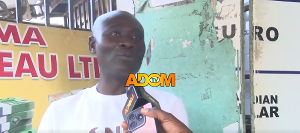The Customs Division of the Ghana Revenue Authority, has revealed that sometimes, importers of especially overaged vehicles may want to delay clearance with the hope of coming to acquire their vehicles through auction which is usually relatively cheaper.
According to the Principal Revenue Officer in Charge of Customs Auctions, Prince Akwaboah, who was speaking on the Eye on Port program, the target of customs auction is the reasonable bidder who has the purchasing power to pay within the reserve price range and not necessarily the highest bidder.
He said one of the reasons is to ensure that importers of vehicles who failed to clear on time, do not get a competitive advantage by bidding higher than fellow bidders.
“We use the reasonable bidder and not the highest bidder, so that if you are the importer you have to go through that same competitive bidding and you may lose your car.”
Mr. Prince Akwaboah revealed that auctions are done in a concealed manner where potential bidders and even the designated auctioneer are not privy to details of auctioned goods prior to day of auction, to ensure a fair bidding process.
The Customs official however indicated that there is a window of opportunity until 48 hrs before auction where an importer of a vehicle who was unable to clear vehicle and therefore his or her car lined up for auction, can write formerly to appeal to the Commissioner General to pay and retrieve the vehicle.
He revealed that Customs has a refund regime where an importer who has lost his vehicle to auction can make a claim to obtain the surplus after the duties have been deducted.
“The onus lies on the importer to enquire from the Customs office how much his car was auctioned for, and then where there is a difference, he can put in an application for refund,” he explained.
He also said Customs allow for importers to pay duties in instalments but before that arrangement is approved, importers would have to write to the Commissioner General explaining reason to pay in instalments as well as demonstrate a capacity to pay.
He disclosed that Customs remove penalty charges applied on imported overaged vehicles during auctions which significantly reduces the reserve price of such vehicles.
“Any cars above ten years, we start imposing penalties on them. But, when we are doing auction, the portion of penalty is not added.”
The Principal Revenue Officer in Charge of Auctions however admitted that the penalty element eliminated from overaged vehicles during auction negatively impacts the initial efforts to discourage the use of such vehicles in the country.
Touching on auctioned government vehicles, the Customs Official also added that, vehicles intended for government where initially, the duty component was exempted, when auctions are done and ownership is transferred to individuals, the duty component would have to be satisfied by the new owner.
“You would have to come back to Customs to regularize the documents by paying the exempted duty,” he stated.
Mr. Akwaboah said the purpose of auctions are for the state to retrieve duties of uncleared goods and that the reserved price for auction goods such as vehicles are equivalent to the duties.
Business News of Thursday, 1 October 2020
Source: Eye on Port

















